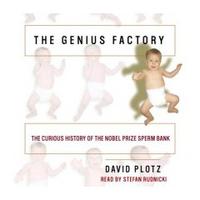The Genius Factory

I am a big fan of nonfiction. I love biographies and, when written well, good commentary on odd subjects. Case in point, Mary Roach's book Stiff about the various ways that human cadavers have been used in science and in life. I became a huge fan of the human composting idea after reading that. So I picked up this nonfiction book hoping to have a similar experience (reading, not human composting).
The Genius Factory is a book by journalist David Plotz that chronicles his investigation into the infamous Nobel Prize Sperm Bank. Mr. Plotz looks into the man behind the sperm bank, the "laureates" who donated, the women who used the sperm free of charge, and the children who followed. He also documents what he believes to be the first time in the US that an anonymous donor met his offspring. The idea behind the sperm bank was optometrist Robert Graham's ideal to combat what was felt to be a decline in the quality of America by collecting the sperm of Nobel Prize winners (of which there was only one ultimately) and using it to improve the genetic pool. Only in this way could we preserve all that was good and smart (oh, don't forget white). In truth, the oft overlooked idea of eugenics skimmed a fine line with naziism and the creation of the perfect race. Dr. Graham specifically admits that he felt that the wrong kind of people were having too many children and since it wouldn't be popular to sterilize them, the only other solution would be to promote the good kind of people to have more babies. I would have enjoyed a deeper dive into the controversy of creating such a genetic pool but the book really doesn't go into it all that much.
The book also held the promise of discussing a topic near and dear to my heart - that of nature vs. nurture. The sperm bank felt that by making "genius sperm" available to women, it could breed genius babies. And in truth, I suspect most people would think that to be plausible when in point of fact, environment plays such a critical role as well. The women who received the sperm were not terribly screened with the exception that they all had to be heterosexual and married. The book does a better job of discussing this topic and it does draw some examples of exactly how different kids produced from the same sperm turned out to be. Toward the end it makes a statement about the importance of not letting predetermined ideas of one's potential guide one's life.
But overall, I found the book less than interesting. The author never committed to any real ideas (maybe a good sign of a journalist). The book discussed more of the human stories rather than the science or the controversy. It was more Oprah Winfrey than 60 Minutes. And I wasn't in the mood for Oprah. For me, the book confirmed my beliefs that any one particular thing, whether it be intelligence, good looks or personality, doesn't make us perfect or any better than anyone else. It is the variability in all of us, both individually and collectively, that makes the human race great.

0 Comments:
Post a Comment
<< Home